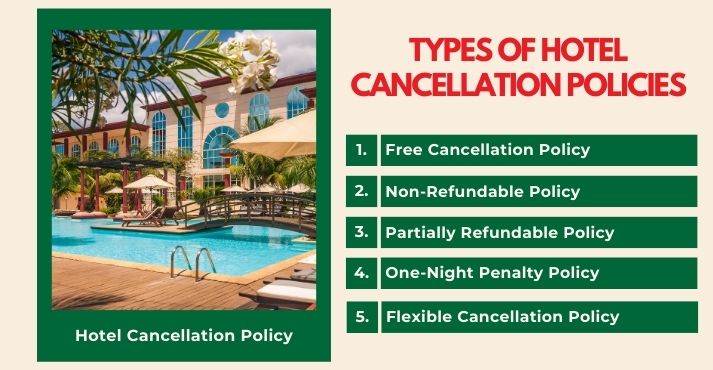Last-minute cancellations can be stressful, especially when it comes to hotel bookings. The fear of losing money or facing unexpected fees can quickly add to the frustration.
A hotel cancellation policy can vary depending on factors such as room rates, seasonality, and local regulations, and many travelers are unaware of how flexible these terms can be.
Hotels usually adjust their cancellation policies to reflect peak seasons, demand, or regional requirements. For example, cancellations may be subject to stricter rules during high-demand periods like holidays.
It’s important to review these policies closely to avoid surprise costs and ensure your booking suits your needs.
What is a Hotel Cancellation Policy?
A hotel cancellation policy explains the rules for canceling a reservation. It includes whether you can cancel a hotel reservation for free, receive a refund, and any potential cancellation fees. On average, 24% of hotel reservations are canceled across all sources, making a well-defined policy even more important.
This ensures that both guests and hotels understand the consequences of changing plans. Some hotels allow free cancellations within a specific timeframe, while others may charge a fee if the cancellation is too close to the check-in date.
A clear hotel refund policy helps them manage room availability, reduce last-minute revenue losses, and keep operations running smoothly.
It also provides confidence in booking and ensures guests know their options if they need to adjust their stay. A well-balanced policy protects the hotel’s business and the guest’s flexibility, creating a fair system for both sides.
Key Elements of a Hotel Cancellation Policy

A hotel cancellation policy helps guests and hotels by setting clear rules for cancellations, refunds, and penalties. It ensures guests understand their options if their plans change while protecting hotels from lost revenue.
The details of the cancellation policy depend on factors like location, the hotel’s pricing strategy, and the booking platform. Here are the important elements most hotels include in their cancellation policies:
1. Cancellation Deadlines
Hotels set specific deadlines for canceling a reservation without a fee. Some allow free cancellations up to 24 or 48 hours before check-in, while others require at least a 7-day notice, especially during busy seasons.
These deadlines help hotels manage their occupancy and prevent last-minute cancellations that could leave rooms unbooked. Most hotels have a refundable policy within a specific time frame, but a hotel cancellation fee may apply after the deadline.
2. Refund Terms and Penalties
The amount refunded depends on how early a guest cancels. For refundable hotel bookings, some hotels offer full refunds when cancellations are made well in advance, while others might provide partial refunds or impose fees for late cancellations.
For example, if a guest cancels within three days of check-in, the hotel might refund only 50% of the booking amount. However, same-day cancellations often result in a full charge. These deadlines help hotels manage occupancy and minimize last-minute cancellations that could leave rooms empty.
3. No-Show Policies
If a guest doesn’t show up and hasn’t canceled their reservation, the hotel’s no-show policy takes effect. Many hotels charge the entire booking amount since the room was held for the guest and couldn’t be resold.
Some hotels may keep the reservation open for a limited time, but the room is released after that, and penalties apply. These policies ensure unoccupied rooms don’t financially impact hotels.
4. Booking Channels and Policy Variance
Cancellation terms can vary depending on where a guest books their stay. Direct bookings with the hotel often come with more flexible policies, while reservations made through online travel agencies (OTAs) or third-party platforms may have stricter cancellation terms.
With trends in online reservation systems evolving, many platforms now offer more customized cancellation options and real-time updates, allowing guests to stay informed and make better decisions.
Therefore, guests should always check the policy associated with their booking channel to avoid confusion or unexpected fees.
Types of Hotel Cancellation Policies

Hotels implement cancellation policies based on booking demand, room rates, and customer expectations. Some policies offer complete flexibility, while others include penalties to protect the hotel’s revenue, especially when dealing with canceled hotel rooms.
Knowing these policies helps travelers make informed booking decisions and allows hotels to manage occupancy effectively. Below are the most common types of hotel cancellation policies:
1. Free Cancellation Policy
This policy allows guests to cancel their reservations without any charges. It is most commonly found in high-end hotels or during off-peak seasons when demand is low. While free cancellations provide flexibility for travelers, they pose a risk for hotels, as last-minute cancellations can lead to unoccupied rooms.
Pros:
- Guests can cancel without financial risk.
- Encourages more bookings due to flexibility.
Cons:
- Hotels may lose revenue from sudden cancellations.
- Rooms may remain vacant, mainly if cancellations occur close to check-in.
2. Non-Refundable Policy
Under this policy, guests pay for their reservation upfront; no refund is given if they cancel. This policy is popular during peak travel seasons or for discounted rates as it guarantees revenue for the hotel.
When It Applies:
- Discounted or promotional rates.
- High-demand periods where hotels anticipate full occupancy.
While this policy ensures financial stability for hotels, it can be restrictive for guests, especially if unexpected changes arise.
3. Partially Refundable Policy
This policy offers a middle ground, allowing guests to receive a partial refund if they cancel within a specific timeframe. For example, a guest may receive a 50% refund if they cancel three days before arrival but forfeit the full amount if they cancel on the check-in day.
Hotels use this approach to balance guest flexibility with revenue protection. Travelers should always check the refund structure to understand how much they will be refunded based on the timing of their cancellation.
4. One-Night Penalty Policy
With this policy, guests who cancel within a specified period, such as 24 to 48 hours before check-in, are charged for one night’s stay. This is one of the most common cancellation policies, as it allows guests some flexibility while still compensating hotels for lost revenue.
Why Hotels Use It:
- Prevents last-minute cancellations.
- Helps cover potential revenue loss from an empty room.
Guests should know the exact timeframe that triggers the penalty to avoid unexpected charges.
5. Flexible Cancellation Policy
Flexible policies allow guests to modify or cancel their reservations with minimal or no penalties. Some hotels even allow last-minute cancellations without charges, particularly for loyal customers or members of their rewards programs.
Benefits:
- Encourages guest trust and loyalty.
- Can lead to repeat bookings and positive reviews.
However, such policies may not be feasible for every hotel, especially smaller establishments that rely on full occupancy to maintain profitability.
Benefits of a Well-Defined Cancellation Policy

A clear and structured cancellation policy by the Central Reservation System at a hotel offers multiple advantages that ensure smoother operations and customer relationships. Here’s a deeper look at why having a well-defined cancellation policy is essential for hotels:
1. Revenue Protection
A well-structured cancellation policy helps protect hotel revenue by reducing the risk of last-minute cancellations. This is important during busy seasons when rooms are in high demand.
By setting clear limits on cancellations, hotels can avoid lost income from unbooked rooms and secure a more predictable cash flow.
This policy also ties into Hotel Revenue Management, which allows hotels to adjust pricing and optimize revenue strategically, even when reservations are canceled close to check-in.
2. Improved Guest Communication and Transparency
A clear cancellation policy promotes transparency and builds trust with guests. When hotels outline specific terms, such as deadlines and penalties, it helps guests make informed decisions and reduces the likelihood of disputes.
Everything is laid out upfront, helping guests understand their options and creating a sense of fairness and clarity. This prevents confusion and enhances the overall guest experience, increasing the chances of repeat bookings.
3. Operational Efficiency
A well-defined cancellation policy improves operational efficiency by streamlining the management of cancellations. Knowing the exact deadlines and terms enables hotels to quickly fill canceled rooms, especially when booking volumes are high.
This flexibility in handling cancellations allows for better inventory management and can significantly boost occupancy rates, especially during peak periods. By managing room availability more efficiently, hotels can maximize their profits and avoid having rooms sit empty.
Best Practices for Communicating Cancellation Policies

Effectively communicating your hotel cancellation policy helps manage guest expectations and minimize misunderstandings, leading to smoother operations for guests and hotel staff. Here are the best practices for clear communication:
1. Visibility on Booking Platforms:
The cancellation policy should be prominently displayed on the booking platform at multiple touchpoints. Ensure it is easy to find and read, especially at the checkout stage, when guests are about to confirm their reservations. This will prevent guests from overlooking essential details and help them make informed decisions.
2. Booking Confirmation Emails:
Once a reservation is confirmed, the confirmation email must reinforce the cancellation policy. A summary of the terms, such as the deadlines for free cancellations and potential penalties, works as a helpful reminder. Including a direct link to the full policy gives guests easy access if they need further clarification.
3. Pre-arrival Communication:
As check-in approaches, reminders about the cancellation policy ensure guests have the most up-to-date information. This reminder can be sent via email, text, or a notification through the hotel’s mobile app. Pre-arrival reminders help guests review their booking and avoid any confusion about the terms, minimizing the chance of last-minute surprises.
By proactively communicating cancellation policies at various stages, hotels can reduce disputes, build trust with guests, and enhance their overall experience. Additionally, offering self-check-in kiosks or mobile check-in options can further streamline the process, ensuring guests receive timely updates on their cancellation terms without needing in-person assistance.
Conclusion
A clear hotel cancellation policy benefits both guests and hotels. It sets everyone’s expectations clearly, preventing unnecessary stress when plans change. With the prevalence of hotel cancellations, offering flexibility or setting clear terms ensures smooth booking management.
Hotels can enhance the guest experience by clearly stating cancellation terms on booking platforms and in emails. A friendly reminder just before check-in can go a long way toward ensuring guests are well-prepared and satisfied with their experience.











